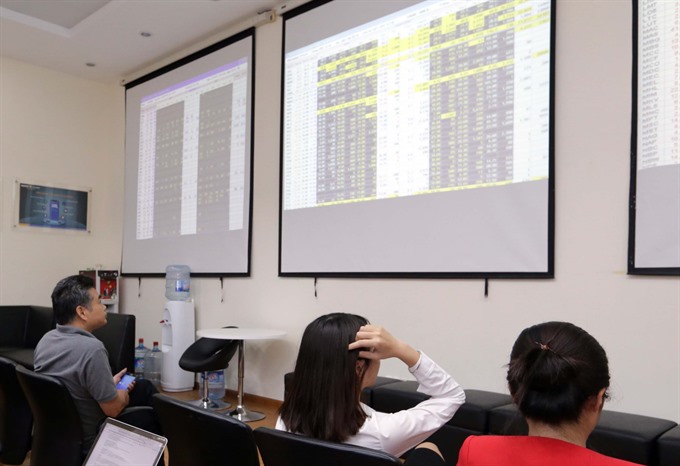The VN-Index ended Wednesday down due to weak demand and investor caution ahead of policy guidance from the US Federal Reserve and the outcome of US-China trade talks.

The VN-Index ended Wednesday down due to weak demand and investor caution ahead of policy guidance from the US Federal Reserve and the outcome of US-China trade talks.
The benchmark VN-Index on the Ho Chi Minh Stock Exchange lost 0.01 per cent to close at 915.84 points.
The southern market index rose 0.41 per cent to close at 915.93 points on Tuesday.
The HNX Index on the Ha Noi Stock Exchange gained 0.43 per cent to end at 102.81 points.
The northern market index gained 0.05 per cent to end at 102.37 points on Tuesday.
More than 161.1 million shares were traded on the two local exchanges, worth VND3.7 trillion (US$160 million).
Companies in the real estate, securities, construction material, banking and food and beverage industries were among the firms that lost ground on Wednesday.
The indices for those industries decreased by between 0.03 and 1.59 per cent, data on vietstock.vn showed.
Large-cap stocks also performed poorly with the blue chip VN30 Index down 0.03 per cent to 869.16 points.
Of the 30 largest stocks by market capitalisation in the VN30 basket, 19 decreased including Vietinbank (CTG), steel maker Hoa Phat Group (HPG), FLC Faros Construction Joint Stock Company (ROS), Mobile World Group (MWG) and Sai Gon Thuong Tin Commercial Joint Stock Bank (STB).
According to BIDV Securities Company (BSC), the market had a slight correction session due to a cautious sentiment ahead of the results of the Fed’s policy meeting announced tonight and tomorrow as well as a high-level meeting between China and the US on trade issues this week.
Lately, the US Government has slapped sanctions on the Venezuelan state-owned oil and natural gas company PVDSA to put pressure on Nicolas Maduro’s administration.
At present, the US is the largest crude importer of Venezuela with an average volume of more than 500,000 barrels each day. Thus, US companies may seek alternative supplies from the Middle East. These sanctions may tighten the US heavy crude industry, resulting in higher crude prices of the US refiners and higher cost of fuel for the US consumers.
As a consequence, as at the end of 29 January 2019, West Texas Intermediate (WTI) price rose by 3.7 per cent to US$53.93 per barrel after declining in the previous session.
Following the move, domestic oil and gas stocks such as PetroVietnam Gas Joint Stock Corporation (GAS), PetroVietnam Technical Services Corporation (PVS), PetroVietnam Drilling & Well Services Corporation (PVD) and PetroViet Nam Coating JSC (PVB) still maintained strong gains, supporting the overall market.
GAS increased 1.1 per cent. PVS increased 2.2 per cent. PVD increased by 1.9 per cent.
According to Bao Viet Securities Company (BVSC), in the last two sessions this week, the market is forecast to keep moving sideways with a wide divergence among stock groups.
“Stock exposure at present should be curbed at 30-40 per cent of the portfolio. Investors with low risk appetite can reduce stock exposure to a low level in the remaining sessions before Tet to avoid potential risks from unpredicted movement of global markets during the holiday,” BVSC said. — VNS





